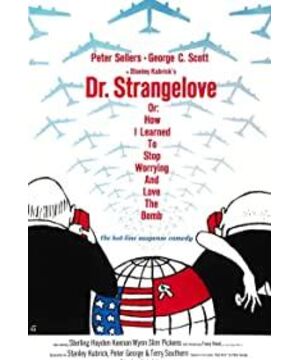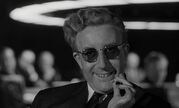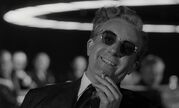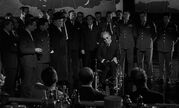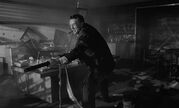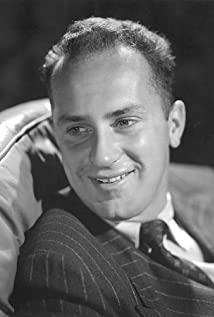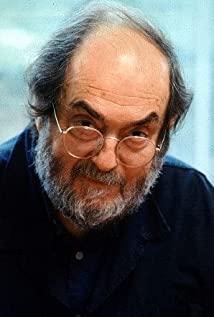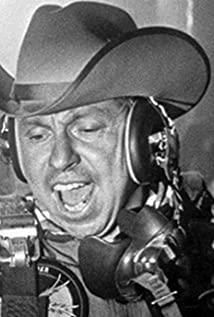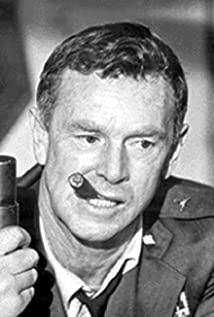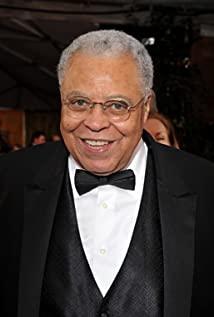The main body of the film is basically thematic political absurd drama, with anti-war factors, but it is undeniable that its theme is pluralistic, otherwise there are many scenes and plots that are difficult to explain.
The theme is diverse, and I write where I think about it.
1. Male suggestion The
opening of the film introduces the rumor of the doomsday device, which is a close-up of bombing aircraft flying in the air. The music is tender and lingering. Here is a suggestion of personality behavior. You can understand it after watching the film.
The captain’s surname is KONG. Don’t blame me for bad English. This surname is only used by gorillas in the English-speaking world. It is also a symbol of maleness.
The captain rode a 20-million-ton nuclear bomb excitedly to the Soviet missile factory. The 20-million-ton nuclear bomb under his crotch was also a symbol of erection.
There are many more, such as the madman Ruipi’s talk about the "essence" of sex, General Buck’s yearning and reverie about Qi Ai’s 1:10 ratio of male to female marriage...
Male = violent destructive power + sexual desire
, and there are many hints, go for it yourself Look
2. The militarization and final Nazification of the country was
originally a German (his prototype may include the factors of German physicists Otto Hanin and Fritz Strassmann), if You don't know who these two guys are, so don't think you can understand the film very well. People who want to understand the meaning of the film need to have a knowledge background roughly similar to that of the director. This is a must.
Now he has gone from a Nazi scientist to a dirty "whitewashing" naturalization process to become the chief technical officer of the US nuclear war. In view of the special uses of nuclear weapons, he is also the president's Cold War strategic adviser and attended the Supreme Military Conference. Moreover, at the final moment when the nuclear war crisis was out of control, all bureaucrats and generals had to ask and count on him! The implication here is clear.
Pay attention to the several metaphors set on the doctor's body in the film.
1. His prosthetic right arm is powerful but uncontrollable. He can't help but perform Nazi military salutes and try to strangle himself. (This is a metaphor, what does the arm point to?)
2. When proposing the nuclear war doomsday response plan, the doctor was more excited than fearful, even so excited, incoherent, high and trembling voice, he mistakenly called the president several times "My head!" (This is a metaphor, what does the head of state mean?)
3. This paralyzed man who relies on a wheelchair miraculously stood up, (the Bible is probably reversed here), see Matthew's Gospel Chapter 9 Scripture: 9:2 Someone carried a paralyzed man on a mattress and came to Jesus. Seeing their faith, Jesus said to the paralyzed man, don't worry, boy. Your sins are forgiven. Please see http://www.hislambs.net/axr/luguang/jdj1-26.htm for a regular explanation of this scripture .
Note that the last line of the film is the doctor’s excitement, distortion and even a little scary voice: "My head, I , I stand up!" This is a metaphor, what do paralyzed and standing mean? )
The setting of the character of Dr. Qi Ai actually means: The United States under the Cold War not only relied on Nazi military technology, but also on Nazi political thinking to survive. As in the film, Dr. Qi Ai not only provided technical advice on nuclear deterrence, but also put forward an absurd overall social plan for the post-nuclear war "mine society" for the president and all bureaucrats! In other words, Nazism has been slowly resurrected under the shadow of the Cold War-the paralytic finally standing up miraculously is a symbol. (Personal opinion, not confirmed by the director himself)
3. The cold war-style "peace"
film of duplicity has a humorous drama element. People who claim to be inclined to peace are actually big war mongers. These plots have given birth to a very good film. The humorous effect. For example,
the Soviet ambassador, who is full of diplomatic rhetoric and pretending to be serious, is actually a part-time photo-stealing spy, and the occupational disease of photo-stealing is still uncontrollable, and sneak shots become addictive;
The strategic bomber base is the final guarantee to ensure that the United States will destroy the red world (of course the earth will be completely destroyed), but the propaganda column of the base is a big book: Our profession is peace;
the Prime Minister of the CPSU, who belongs to the people, ordered a passive detonation doomsday. Device, any nuclear attack by the enemy will initiate the destruction of this earth, and the pollutants will last for 100 years. It’s worth intriguing that almost no Americans are afraid of hearing this news, but classify it as a blackmail tactic.
In order to explain the misunderstanding, the president's phone call, which said "Sauri", almost became a Chinese cross talk.
General Barker is a concentrated performer of cold war-style "peace" with duplicity. He reported to the president that Rippi was crazy when he launched Project R without authorization. You can see that he was actually too excited to control himself, but he was still stern in front of the president. Face regrets this command "mistake." After talking for a while, it turned to the new topic of instigating the president to do everything possible to attack the Soviet Union in an all-round way. When all the planes were recalled, poor Buck was deeply disappointed, but when the Prime Minister of the Communist Party of the Soviet Union protested that one of the planes had slipped through the net, he almost danced with joy: It’s wonderful to destroy the Soviet Union-all publicism-and the entire planet. NS! ! !
(PS Birdcage Mountain’s silly big wooden lines also have the same effect: "When I destroy the earth, I will give you a bonus!" It is really comparable.)
4. Hostility + closure + madness = Cold War-style estrangement
film story There are three main locations: the
first is the U.S. Department of Defense war room; the huge dark space with no ceiling, only the faces of dignitaries in front of the huge conference round table under the spotlight, and the big map of the Soviet Union; the
second is Captain Kong The cockpit, control room and bomb bay of the B-52 bomber are full of festive atmosphere; the
third is the exterior view of the air force base and the interior of the office.
The beginning of the film. There is no longer a communication relationship between the three, and they do their own things. Because of the cold war, fear of eavesdropping, counter-espionage, and interference by the enemy, a series of professional reasons have closed almost all communication channels.
Even in every scene, it is difficult to communicate between people. The squad rushing to the airport was mercilessly ambushed by the defending army to prevent the Russian army from posing as a sneak attack; in the face of the British deputy, Rippi talked about his "body fluid philosophy" from time to time, sometimes not marginal, sometimes lunatic; in the war room Hotline chatter, military bureaucrats' temptation to war against the president, topic shifting, and quarrels and scuffles with Soviet ambassadors.
Kubrick used "estrangement" to narrate, and in the dilemma of unclear reason, he explained the truth clearly, hehe, formed a unique narrative style.
5. The role of seven talks about
Peter
. The first one in the film is the commander of the United States Air Force Base, Adjutant Mandrick, a typical civilian British Air Force, sissy, a little feminine, and always talk about the gentleman's elegant words, and this deputy is also exactly the same. It is in line with the statement that "Britain is the follower of the United States" in the Cold War situation. In front of the American boss, Mandrick was very timid, weak, docile, and somewhat docile, but he was still a little stubborn and responsible. This little man seemed to be more humane than the big ones.
The second is the American president who wears glasses and has a big bald head. His thinking is a little confused and his speech is a little erratic. There are almost no close-up shots of his personal head in the film, and he is always "submerged" in a group of politicians and staff. , The darkness of the hall seemed even more insignificant and unimportant. Perhaps it is the performance that he is just a professional politician identity characteristic, portraying him has no opinion.
The third is Dr. Qi Ai, the core figure, a nuclear war planner with a smile on his face, slightly wise, contemptuous and funny. Although he is a disabled person in a wheelchair (a metaphor for severely wounded Nazism), he is like a great Nazi head of state. He is good at speech and agitation, is very emotional, is agitated, has a very large range of movements, and habitually twitches his stiff body from time to time. The sky full of stars talked about its doomsday vision, which gave people an absolute deep impression. This character is very abrupt and eye-catching in the film. What does he represent? Maybe he does not represent someone, but the spiritual source of the Cold War and nuclear war.
Can you tell these three people are all performed by one actor?
Pay tribute to Lao Ku. The fourth one is Rippi, the commander of the Air Force Base, an ideologically poisoned war madman. Note that the director used an elevation lens to shoot his facial features many times. That big cigar does not represent his majesty. Is it an erection?
Fifth, the bomber commander, Major "Gang", is another ideologically poisoned war madman. He cut off all contact with the outside world and became excited, giving radical speeches to inspire his subordinates, and finally riding a nuclear warhead excitedly calling out, Going down to realize his
sixth dream of a nuclear war hero , General Barker seems to be indifferent to peace, and he is still a war madman with a heavily poisoned ideology, except of course for women, he even flirts with his sexy female secretary. But once he learned of the seriousness of the situation, he panicked more than anyone else. The funny behavior in the combat room was not uneasy, but his inner excitement and excitement, comparable to Major "Gang".
Seventh, Buck's female secretary and lover, this is the only woman in the film, so I have to mention that the scenes that appear are extremely limited, basically just a vase. Politics has nothing to do with women, but with sex. Looking at the erotic taste of the few shots, isn't it enough for sexual suggestion?
2010.5.31 modified again
View more about Dr. Strangelove or: How I Learned to Stop Worrying and Love the Bomb reviews


